“You and Me, Us never part, Makidada. You and Me, Us have one heart, Makidada. Ain’t no ocean, ain’t no sea, Makidada. Keep my sistah away from me, Makidada”
”Makidada”, translates to “little sister” in the Swahili language.
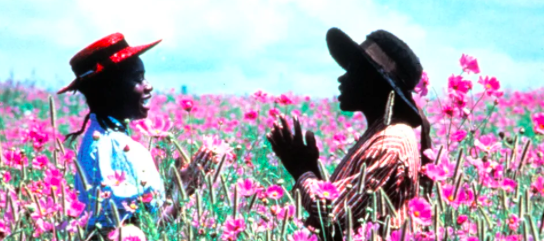
“The Color Purple” is a captivating and emotional film that surrounds the story of a young African American woman whose name is Celie. Celie and Nettie are sisters, inseparable. After many young years of being abused by her father, Celie is given to another abusive man whose name is Albert (Mister). Her life is turned from bad to worst when Albert continues to treat her like a slave and separates Celie and Nettie.
“The Color Purple” showcases the environment of African American woman narratives through Celie Harris’s life. This film takes a setting in the early 1900s. In the beginning of the film, we see that Celie and Nettie have a very close and strong sister-relationship. During the film, Celie narrates her story through letters to God. Always beginning with “Dear God…” This shows her strength in her faith. We learn through her first letter that she is being sexually abused by her father, having her fall pregnant from him twice. She has two kids, which she never truly met or knew until the ending of the film. Their names are Olivia and Adam.
It wasn’t long before a man named Albert (Mister) paid close attention to Nettie (Celie’s younger sister). He asks her father for Nettie’s hand in marriage, and the father declines and tells him to take Celie instead. The father explained that Nettie was too young to get married. He also explained that Albert can have Celie, only because she was the eldest in the family and she should get married first. Letting him know right on the spot that Celie is “spoiled“, which means she fell pregnant and has given birth before. As she leaves her home, she fears that her father would do the same thing he did to her, to her little sister Nettie. This leads to Nettie to running away from home and seeking help from her sister and her husband Albert.
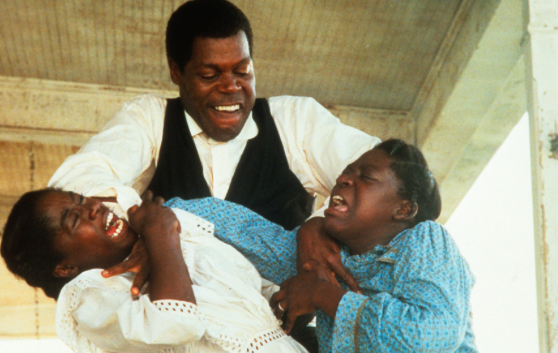
This image shows Celie (Left with blue dress) being separated from her sister, Nettie (Left with white dress) by her husband Albert (Middle). This happened after Albert tried to force himself onto Nettie, and she attacked him. This particularly left a scar on Celie’s heart, because of how close she is to her sister.
After her sister’s departure, Celie went through tremendous amounts of trauma and pain from her husband. She almost loses herself in the process, but she never gave up hope that her sister would write to her soon. Which she never received the letters because of her abusive husband, Albert, hiding them from her.
This image shows Celie (Left) and Shug (Right), the moment Shug found a letter from Nettie to Celie. Celie finds peace in her sister’s letters. Which Nettie constantly states in her letters, “I know you think I’m dead. But I am alive”. It leads to them turning the house upside down to find the rest of the letters. She also finds out through the letters that Nettie has found Celie’s kids and are raising them as her own.
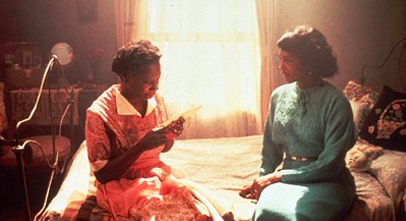
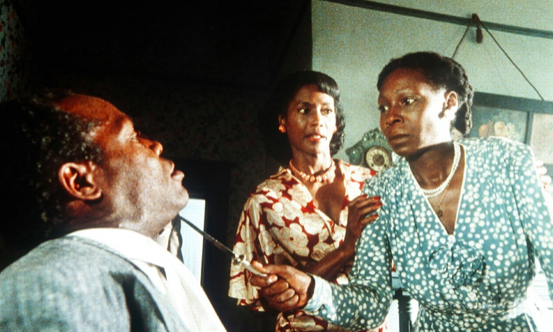
This image shows the moment Celie had the strength to fight against her husband, Albert. Her friend Shug (Middle) is trying to deescalate the situation and offer her a way out of the traumatizing life Celie had. This is where Celie said her famous lines, “Until you do right by me, everything you know gonna crumble.”
This image shows the last scene of the film when she finally reunites with her sister, Nettie and her two kids, Olivia and Adam. She is overwhelmed with joy and happiness.
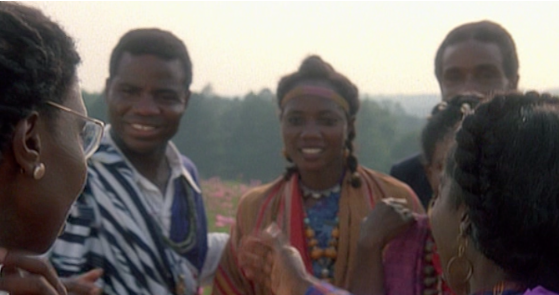
Themes
Love and Empowering Relationships: Celie and Nettie share a type of love that is inseparable. During the worst times in her life, she develops empowering relationships with close friends like Shug and Sofia.
Racism and Sexism Society: Because of the film being set in the early 1900s, there was still a huge case of normalized racism and sexism. In the end of the film when Celie leaves her husband, he reminds her, “You’re black. You’re poor. You’re ugly. You’re a woman. You’re nothing.”
Self acceptance and Independence: With the help of her friends Shug and Sofia, she was able to retrieve her sister’s letters which her abusive husband was hiding from her. She gains strength and faith to stand up against her husband and leave him.
Reflections
This was a very emotional film. There were some scenes that we hard to watch and hard to digest. It was also inspiring and joyful to see the peace that Celie and Nettie finally had at the end of the film. It reminds me that there is a light at the end of every dark tunnel. Celie never took revenge upon her abusers, she always let time do its duties. Her last words to her abusive husband were, “I’m poor, black, and maybe even ugly… But dear God, I’m here.”
It reminded me a lot of my younger sister and our relationship with each other. My sister is my best friend. She knows me better than anyone. She understands my struggles and my joy. She is my Makidada.
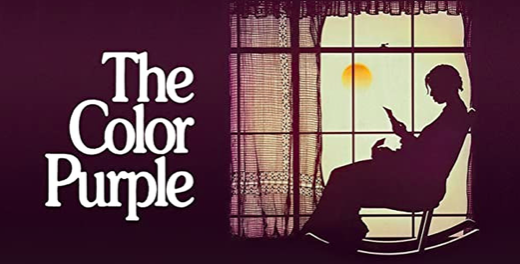
Comments
3 responses to “The Color Purple (1985)”
Great post-Carmen; I always find “The Color Purple” an intense movie. It’s sad but healing, reminding us that life can change significantly. You can go from being a victim to a hero or from being a bully to being sorry. Celie’s story is like my journey toward redemption and personal growth. The movie shows us how meaningful relationships are. Celie’s bond with Nettie and friendship with Shug and Sofia are powerful. These relationships help us see parts of ourselves we didn’t know existed. Watching Celie learn to be assertive is really inspiring to me. She went through so much and still came out on top. The movie reminds us how important having good friends and support systems is. It shows us the strength we can find in sisterhood and friendship and how they can help us become who we’re meant to be. But here is a twist: I’ve watched this film in many ways, film, on Broadway and in a biopic. But I find Mister’s character to be the most daunting. He is a hurt individual, hurting individuals. But it was Ceily who changed him. Till you do right by me.”… That was all she said, and it came back around that nothing was right in his life until he did right by her. He got her sister back. I paid the cost and all. We leave the film thinking, “Hooray sisters are united, but the realness is that healing for the beast took place. A man was humbled and now has been given a second chance.
I watched the remake a few days ago. This movie never fails to pull on my heart strings. It’s interesting to see what use to be considered okay by society. You weren’t a man if you didn’t hit your wife into obedience and it was not a women’s place to speak up for herself. It shined a light on sexual abuse and child marriage. Which always makes me want to turn the tv off. We can’t shy away from these topics though, because this is a reality for more children than we can even fathom. I always tell if learning about this makes me uncomfortable imagine how the people feel who actually experienced it.
Carmen,
First, I wanted to draw attention to the aesthetic you picked – because I love it! It was pretty but also, it was a really nice stark contrast from the darkness in the movie. Second, I love this movie – it is one of my all time favorites and I think you did a really nice job of summarizing the movie and connecting it to personal connections in your own life. I too was in awe of Celie’s resilience; it is something that I still think about when I look back on the movie. What was the most important take-away from this movie to you?